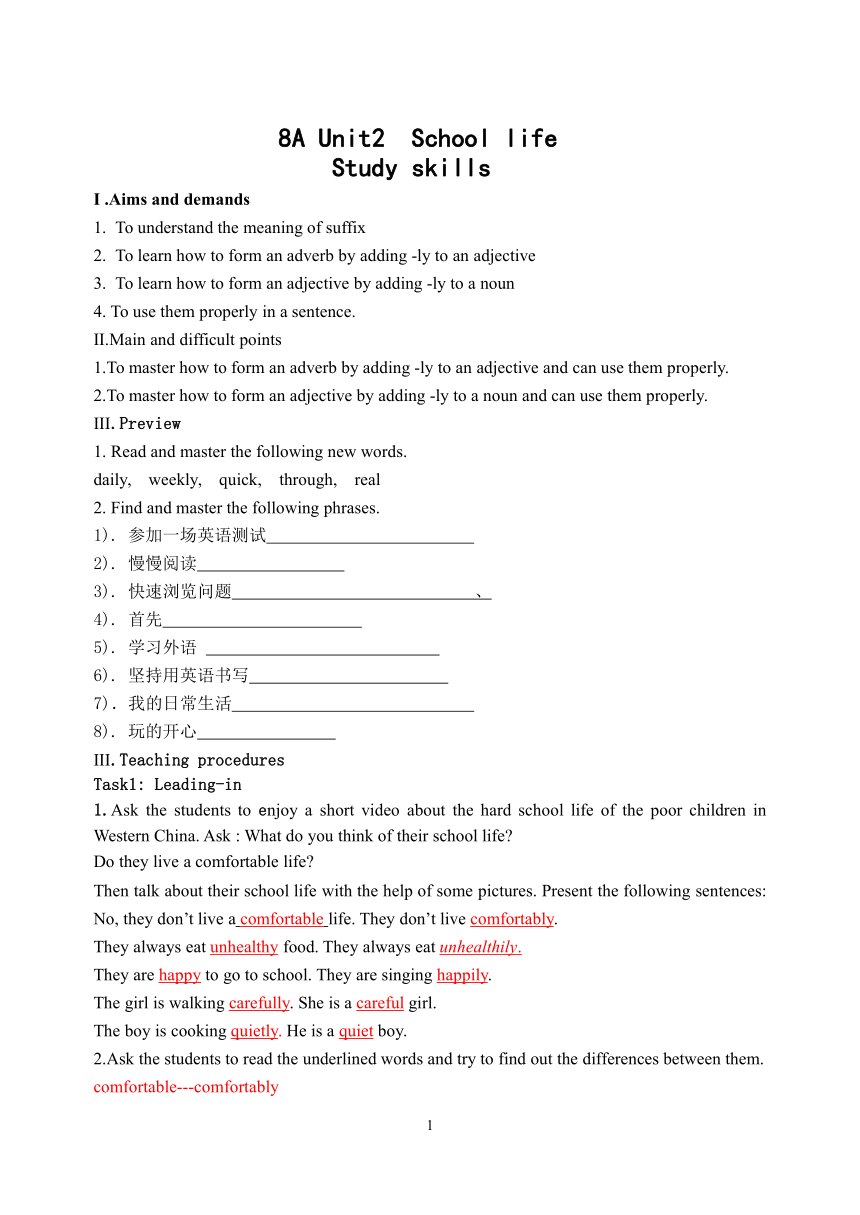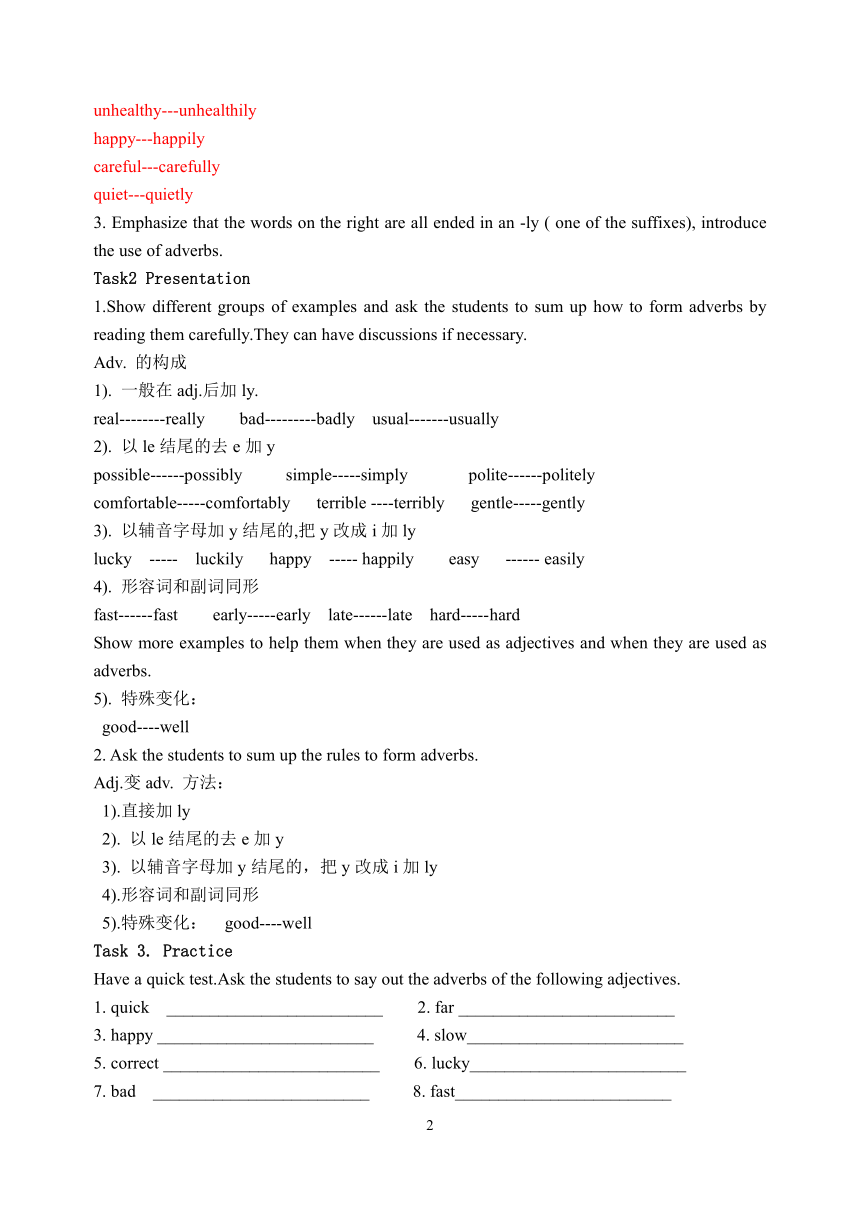Unit 2 School life Study skills The suffix-ly 教案
文档属性
| 名称 | Unit 2 School life Study skills The suffix-ly 教案 |

|
|
| 格式 | doc | ||
| 文件大小 | 40.5KB | ||
| 资源类型 | 教案 | ||
| 版本资源 | 牛津译林版 | ||
| 科目 | 英语 | ||
| 更新时间 | 2023-01-02 00:00:00 | ||
图片预览


文档简介
8A Unit2 School life
Study skills
I .Aims and demands
1. To understand the meaning of suffix
2. To learn how to form an adverb by adding -ly to an adjective
3. To learn how to form an adjective by adding -ly to a noun
4. To use them properly in a sentence.
II.Main and difficult points
1.To master how to form an adverb by adding -ly to an adjective and can use them properly.
2.To master how to form an adjective by adding -ly to a noun and can use them properly.
III.Preview
1. Read and master the following new words.
daily, weekly, quick, through, real
2. Find and master the following phrases.
1). 参加一场英语测试
2). 慢慢阅读
3). 快速浏览问题 、
4). 首先
5). 学习外语
6). 坚持用英语书写
7).我的日常生活
8). 玩的开心
III.Teaching procedures
Task1: Leading-in
1.Ask the students to enjoy a short video about the hard school life of the poor children in Western China. Ask : What do you think of their school life
Do they live a comfortable life
Then talk about their school life with the help of some pictures. Present the following sentences: No, they don’t live a comfortable life. They don’t live comfortably.
They always eat unhealthy food. They always eat unhealthily.
They are happy to go to school. They are singing happily.
The girl is walking carefully. She is a careful girl.
The boy is cooking quietly. He is a quiet boy.
2.Ask the students to read the underlined words and try to find out the differences between them.
comfortable---comfortably
unhealthy---unhealthily
happy---happily
careful---carefully
quiet---quietly
3. Emphasize that the words on the right are all ended in an -ly ( one of the suffixes), introduce the use of adverbs.
Task2 Presentation
1.Show different groups of examples and ask the students to sum up how to form adverbs by reading them carefully.They can have discussions if necessary.
Adv. 的构成
1). 一般在adj.后加ly.
real--------really bad---------badly usual-------usually
2). 以le结尾的去e加y
possible------possibly simple-----simply polite------politely
comfortable-----comfortably terrible ----terribly gentle-----gently
3). 以辅音字母加y结尾的,把y改成i加ly
lucky ----- luckily happy ----- happily easy ------ easily
4). 形容词和副词同形
fast------fast early-----early late------late hard-----hard
Show more examples to help them when they are used as adjectives and when they are used as adverbs.
5). 特殊变化:
good----well
2. Ask the students to sum up the rules to form adverbs.
Adj.变adv. 方法:
1).直接加ly
2). 以le结尾的去e加y
3). 以辅音字母加y结尾的,把y改成i加ly
4).形容词和副词同形
5).特殊变化: good----well
Task 3. Practice
Have a quick test.Ask the students to say out the adverbs of the following adjectives.
1. quick _________________________ 2. far _________________________
3. happy _________________________ 4. slow_________________________
5. correct _________________________ 6. lucky_________________________
7. bad _________________________ 8. fast_________________________
9. easy_________________________ 10. quiet_________________________
11. real _________________________ 12. wide_________________________
13. early _________________________ 14. hard_________________________
Ask the students to do them one by one as quickly as they can.
Task4. Presentation
1. Ask the students to have a look at the following sentences.
1). She is a lovely girl.
2). They are very friendly.
3). Your voice sounds so beautiful.
lovely , friendly and beautiful 是__________词
2. Encourage them to find out the use of adjectives, sum up by themselves first.
adj. 用法:
1)修饰名词用adj.
2) be.+adj
3)系动词+adj. (look/sound/smell/ taste/feel/seem----)
Complete the following sentences.
We should eat __________ (health) food everyday.
The food taste ________ (badly).
They are very ________ (easily)
3.Show more examples to help the students understand how to form adjectives.
We can add -ly to some nouns to form adjectives.
Task5. Practice
1.Do partA on P27. Ask the students to add -ly to each of the words in the box on the left. Then put them in different groups.
2. Check the answers together.
Task6. Brainstorming
Have a competition. Students work in groups and try to form a new word/new words by adding a suffix or prefix to a word, see which group can form the most words in three minutes.
Task7. Practice
1.Do partB on P27. Millie is writing in her diary. Complete her entry with the correct forms of the words in brackets.
2. Ask some individuals to read out their answers.Check together.
3.Deal with some key points.
1). keep writing in English坚持用英语写作
keep (on) doing sth. 继续做某事
keep sb. doing sth. 让某人一直做某事
e.g. 继续尝试,你会成功的。
Keep trying, you will be successful.
别让我等太久
Don’t keep me waiting too long.
2). learn to use English (in)this way
通过这种方式学习使用英语
learn to do sth. 学习做某事
e.g. 我妹妹正在学习弹钢琴。
My sister is learning to play the piano.
way 途径,方式,方法
(in) this way 用这种方法,通过这种途径
(in) that way, in many/different ways
3). look through
Task8. Consolidation
A. Complete the sentences with the right forms of the given words.
1. I keep _______ (write) in English to improve (提高) my English.
2. We’ll have the _______ (week) test this Saturday.
3. _____ (day) English is a useful book.
4. English is one of her favourite _______ (subject).
5. The old man learnt _____ (use) the computer from his grandson.
6. _______ (sad),Andy hurt his leg in the big fire last week.
7. _______ (luck), no one was_______ (bad) hurt in the car accident (事故).
8. He’s busy but he keeps visiting his grandparents_________ (week) .
9. --What’s your _________(month) pay (工资)
-- It’s a secret.
B. Translation
1. 我父亲快速浏览了这封邮件。
My father _____________________ the mail quickly.
2. 起初,我不喜欢喝咖啡。
___________________, I did not like drinking coffee.
3. 老师让一直他打扫教室。
The teacher _______________________ the classroom.
4. 以这种方式,你英语学得会更快、更好。
____________________, you can learn English faster and better.
C. Conclusion
1. A word with a suffix is usually different in the part of speech from the original word (后缀通常改变原词性) .
e.g. friend (n.) -- friendly (adj.), able (adj.) -- ability (n.),busy (adj.)—business (n.), etc.
2. Not every noun can be changed into adjective by adding -ly to the end.
3. Not every adjective can be changed into adverb by adding -ly to the end.
If you’re not sure, consult your dictionary(向字典求教)!
PAGE
5
Study skills
I .Aims and demands
1. To understand the meaning of suffix
2. To learn how to form an adverb by adding -ly to an adjective
3. To learn how to form an adjective by adding -ly to a noun
4. To use them properly in a sentence.
II.Main and difficult points
1.To master how to form an adverb by adding -ly to an adjective and can use them properly.
2.To master how to form an adjective by adding -ly to a noun and can use them properly.
III.Preview
1. Read and master the following new words.
daily, weekly, quick, through, real
2. Find and master the following phrases.
1). 参加一场英语测试
2). 慢慢阅读
3). 快速浏览问题 、
4). 首先
5). 学习外语
6). 坚持用英语书写
7).我的日常生活
8). 玩的开心
III.Teaching procedures
Task1: Leading-in
1.Ask the students to enjoy a short video about the hard school life of the poor children in Western China. Ask : What do you think of their school life
Do they live a comfortable life
Then talk about their school life with the help of some pictures. Present the following sentences: No, they don’t live a comfortable life. They don’t live comfortably.
They always eat unhealthy food. They always eat unhealthily.
They are happy to go to school. They are singing happily.
The girl is walking carefully. She is a careful girl.
The boy is cooking quietly. He is a quiet boy.
2.Ask the students to read the underlined words and try to find out the differences between them.
comfortable---comfortably
unhealthy---unhealthily
happy---happily
careful---carefully
quiet---quietly
3. Emphasize that the words on the right are all ended in an -ly ( one of the suffixes), introduce the use of adverbs.
Task2 Presentation
1.Show different groups of examples and ask the students to sum up how to form adverbs by reading them carefully.They can have discussions if necessary.
Adv. 的构成
1). 一般在adj.后加ly.
real--------really bad---------badly usual-------usually
2). 以le结尾的去e加y
possible------possibly simple-----simply polite------politely
comfortable-----comfortably terrible ----terribly gentle-----gently
3). 以辅音字母加y结尾的,把y改成i加ly
lucky ----- luckily happy ----- happily easy ------ easily
4). 形容词和副词同形
fast------fast early-----early late------late hard-----hard
Show more examples to help them when they are used as adjectives and when they are used as adverbs.
5). 特殊变化:
good----well
2. Ask the students to sum up the rules to form adverbs.
Adj.变adv. 方法:
1).直接加ly
2). 以le结尾的去e加y
3). 以辅音字母加y结尾的,把y改成i加ly
4).形容词和副词同形
5).特殊变化: good----well
Task 3. Practice
Have a quick test.Ask the students to say out the adverbs of the following adjectives.
1. quick _________________________ 2. far _________________________
3. happy _________________________ 4. slow_________________________
5. correct _________________________ 6. lucky_________________________
7. bad _________________________ 8. fast_________________________
9. easy_________________________ 10. quiet_________________________
11. real _________________________ 12. wide_________________________
13. early _________________________ 14. hard_________________________
Ask the students to do them one by one as quickly as they can.
Task4. Presentation
1. Ask the students to have a look at the following sentences.
1). She is a lovely girl.
2). They are very friendly.
3). Your voice sounds so beautiful.
lovely , friendly and beautiful 是__________词
2. Encourage them to find out the use of adjectives, sum up by themselves first.
adj. 用法:
1)修饰名词用adj.
2) be.+adj
3)系动词+adj. (look/sound/smell/ taste/feel/seem----)
Complete the following sentences.
We should eat __________ (health) food everyday.
The food taste ________ (badly).
They are very ________ (easily)
3.Show more examples to help the students understand how to form adjectives.
We can add -ly to some nouns to form adjectives.
Task5. Practice
1.Do partA on P27. Ask the students to add -ly to each of the words in the box on the left. Then put them in different groups.
2. Check the answers together.
Task6. Brainstorming
Have a competition. Students work in groups and try to form a new word/new words by adding a suffix or prefix to a word, see which group can form the most words in three minutes.
Task7. Practice
1.Do partB on P27. Millie is writing in her diary. Complete her entry with the correct forms of the words in brackets.
2. Ask some individuals to read out their answers.Check together.
3.Deal with some key points.
1). keep writing in English坚持用英语写作
keep (on) doing sth. 继续做某事
keep sb. doing sth. 让某人一直做某事
e.g. 继续尝试,你会成功的。
Keep trying, you will be successful.
别让我等太久
Don’t keep me waiting too long.
2). learn to use English (in)this way
通过这种方式学习使用英语
learn to do sth. 学习做某事
e.g. 我妹妹正在学习弹钢琴。
My sister is learning to play the piano.
way 途径,方式,方法
(in) this way 用这种方法,通过这种途径
(in) that way, in many/different ways
3). look through
Task8. Consolidation
A. Complete the sentences with the right forms of the given words.
1. I keep _______ (write) in English to improve (提高) my English.
2. We’ll have the _______ (week) test this Saturday.
3. _____ (day) English is a useful book.
4. English is one of her favourite _______ (subject).
5. The old man learnt _____ (use) the computer from his grandson.
6. _______ (sad),Andy hurt his leg in the big fire last week.
7. _______ (luck), no one was_______ (bad) hurt in the car accident (事故).
8. He’s busy but he keeps visiting his grandparents_________ (week) .
9. --What’s your _________(month) pay (工资)
-- It’s a secret.
B. Translation
1. 我父亲快速浏览了这封邮件。
My father _____________________ the mail quickly.
2. 起初,我不喜欢喝咖啡。
___________________, I did not like drinking coffee.
3. 老师让一直他打扫教室。
The teacher _______________________ the classroom.
4. 以这种方式,你英语学得会更快、更好。
____________________, you can learn English faster and better.
C. Conclusion
1. A word with a suffix is usually different in the part of speech from the original word (后缀通常改变原词性) .
e.g. friend (n.) -- friendly (adj.), able (adj.) -- ability (n.),busy (adj.)—business (n.), etc.
2. Not every noun can be changed into adjective by adding -ly to the end.
3. Not every adjective can be changed into adverb by adding -ly to the end.
If you’re not sure, consult your dictionary(向字典求教)!
PAGE
5
